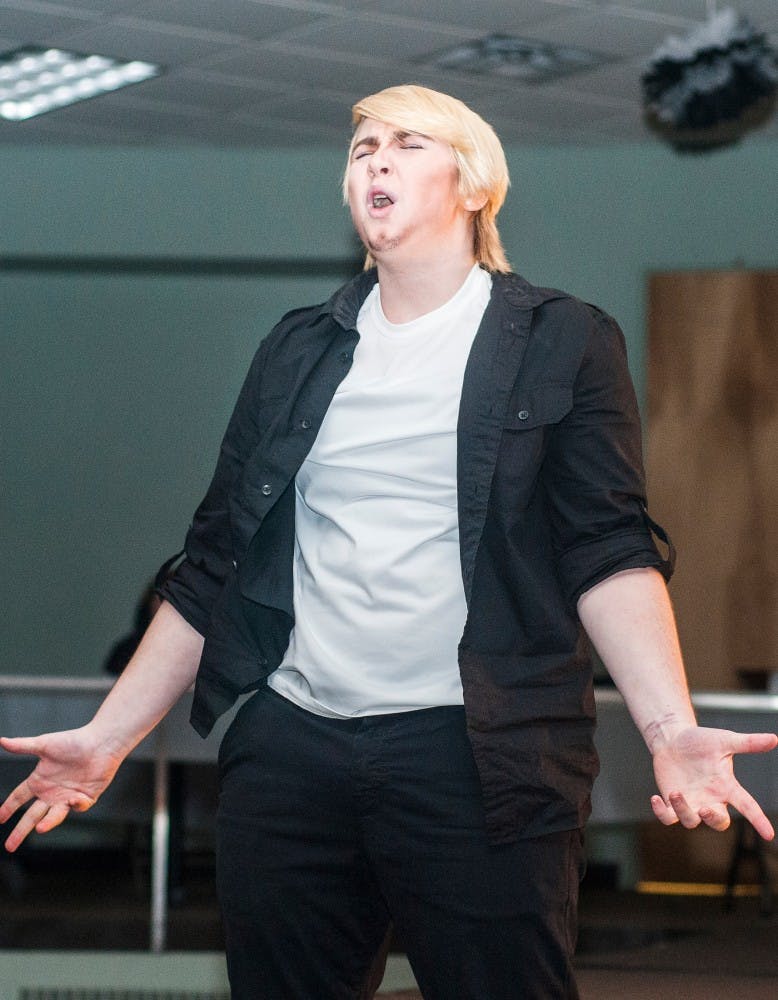As the doors of the Wonders Hall Kiva opened, Lauren Smith was getting more and more impatient.
“I’m nervous,” Smith admitted as her time to perform approached.
Smith, a psychology sophomore who identifies as genderqueer, was performing for the first time in the PRISM 2014 Drag Show. This was Smith’s debut as a drag king.
Smith said she learned about the term genderqueer when she joined one of the organizations on campus for the LGBTQ community.
“I just thought I was a tomboy because that’s (what) I called myself growing up, but then when I heard genderqueer I identified with that more,” Smith said. “How I present is a little more androgynous than a female would.”
According to the LBGT Resource Center, a genderqueer is “an individual whose gender identity is neither male nor female, is between or beyond genders, or is some combination of genders.”
“I don’t face as many problems as other people because I tend to look a bit more female than I would like, but it helps me pass as female,” Smith said.
Although she would prefer to use gender-neutral pronouns, Smith said the fact that she uses female pronouns such as “she” and “her” has helped her avoid a lot of controversy.
But that is not the case for James Madison freshman Koda Murray.
“I asked my close friends and the people that I talk to on a daily basis to use the right pronouns and to use the name I prefer,” Murray said. “I think most of them are very accepting (of) that.”
As a non-binary, Murray uses non-gender pronouns such as they, them and their.
“I think that gender is a little more drastic. It’s a bigger part of who you are in my opinion, than your sexuality,” Murray said.
Deanna Hurlbert, the director of the LBGT Resource Center, said identifying someone with the wrong pronoun can be misleading and disrespectful.
“Referring to someone with an inaccurate gender pronoun is kind of the equivalent of calling someone a name that is not theirs or identifying (a) face that’s not theirs,” Hurlbert said. “You are denying something that’s real and true and important about that person’s identity.”
Hurlbert said the best way to avoid assumptions is by asking the person their preferred pronoun or to just call that person by their name.
“There are people who may have pronouns that are different than what might have been socioculturally assumed abut that person,” Hurlbert said. “It is a courtesy to use their true gender expression and pronouns as a way to express gender.”
Not everyone feels the need to change their pronouns.
Apparel and textile design sophomore Mitch Fehrle said the usage of male pronouns is part of his identity and has some benefits.
“I think it has certain benefits because when I say I’m a gay male people can relate to that and understand a large part of who I am,” Fehrle said.
Fehrle said it was not on him to decide a permanent gender identity.
“It came through other people,” Fehrle said. “It was not (necessarily) my own choice. If I didn’t have to make this decision, I wouldn’t have this firm identity because it’s something that can isolate you.”
Smith, Murray, Hurlbert and Fehrle all agreed that people don’t always need to be identified with pronouns.
"(Identify me) as non-binary, as ‘they’ and as Koda. That’s who I am and that’s what I want to be,” Murray said.







